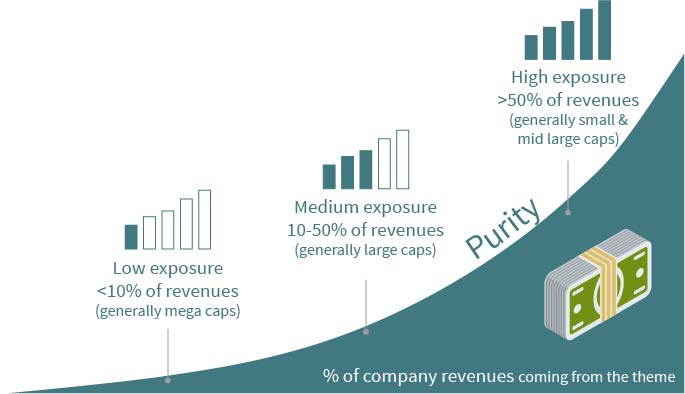What is thematic investing?
Thematic investing – often called trend investing or mega-trend investing – is a broad term used to describe investment approaches which focus on certain economic, corporate, social or technological themes. In today’s highly disruptive world, these themes are typically focussed around the main two drivers of long-term corporate behaviour – demographic shifts and technological changes.
The five evolving economy themes we have identified are the results of long-term demographic trends and technological developments. We believe they can offer equity investors access to the best opportunities for long-term structural growth, regardless of how companies are defined geographically or from a sector perspective.
Does thematic investing work?
We believe that geographic or investment sector definitions – which were once a convenient way for investors to classify companies and decide asset allocations – must evolve to meet the reality that the world is increasingly complicated and connected than ever before.
A thematic investment approach aims to help investors:
- Tap into drivers of long-term change and growth
- Better identify companies’ longer-term prospects
- Articulate particular investment convictions
Is thematic investing a long-term approach?
We believe that thematic investing should fundamentally seek long-term outcomes for investors and is therefore a rational rather than fashionable approach. In fact, we see thematic as the new normal of equity investing.
While many individual themes or trends can capture investors’ attention, it’s important to take a nuanced and diversified approach. This can help investors mitigate volatility and cyclicality which may arise from a theme having a small or concentrated investible universe of suitable companies.
To help people invest in the companies that are embracing these changes, we have adapted our internal research capabilities to incorporate the five main trends that we believe represent the future for long-term fundamental growth investing.

Ageing and lifestyle
Ageing population trends are creating opportunities for long-term growth investors due to growing demand for healthcare, leisure, wellness, housing and more.

Connected consumer
Digitalisation empowers consumers like never before with 24 hour, mobile access to a vast choice of products - companies must evolve to remain competitive.

Automation
More industries can now use robotics offering greater sophistication, precision for repetitive or hazardous tasks, and may provide affordable labour solutions.

Clean Economy
Innovative companies are creating solutions to address pressures on scarce natural resources and the need for greenhouse gas emission reduction.

Transitioning societies
A rapidly growing global middle class is likely to create growth opportunities as goods and infrastructure demand shifts from the basic to the aspirational.
Active thematic investing
Disruption in the corporate world is dynamic in nature, and it is therefore critical to identify the individual long-term winners, as there are losers even in areas of high structural growth.
Understanding the difference between short-term hype and longer-term commercial reality is therefore crucial for investors looking for sustainable performance.
A thematic approach can also help investors understand how companies which are evolving their business model might fare in future – for example, a company which still generates most of its revenues today from a traditional business or product, may be making great strides into a new industry or customer base that may make it a compelling long-term investment.
Why AXA IM for thematic investing?
To differentiate market hype from the investable reality when identifying long-term trends, we look for evidence (like research/statistics from relevant and credible sources) that the theme has the potential to deliver 10% or more growth year-on-year over the next decade.
As companies become more global and more multi-sector, understanding a businesses’ market, strategy and customers is crucial to identifying the long-term winners and losers within a theme.
- Time tested active approach since 1960
- Focus on companies with the proven ability to deliver commercially sustainable results from innovations
- 100s of meetings each year with company management helps us identify winners and losers
Our active selection approach is rooted in AXA IM Equity’s’ fundamental philosophy of selecting high-quality companies we think have the highest potential, rather than just investing in a basket of stocks that operate in a certain sector.
To give investors access to long-term drivers of returns, we have evolved our collaborative research organization to prioritise thematic exposure over geographic and sector information which is less relevant for evaluating today’s multi-sector businesses.
- Collaborative research pods help us combine deep expertise with a best-ideas approach
Our proprietary thematic exposure database also allows us to quantify companies’ levels of exposure to specific themes across the evolving economy, across a universe of approximately 11,000 listed companies.

Our portfolios tend to have a high level of purity related to the themes. Typically more than 70% of stocks in our portfolio have high or medium exposure to a specific growth theme. This ensures high thematic purity with suitable diversification, while also allowing us to invest in companies with high potential at an earlier stage of tapping into long-term trend or changing their business.
Note: All figures quoted are from AXA IM, correct as at 30 September 2020.
Risks considerations for this strategy:
Growth targets are internal, for illustrative purposes only, and are not guaranteed. All investment involves risks, including the loss of capital. Thematic equity investing approaches are invested in financial markets and use techniques and instruments which are subject to some levels of variations, which may result in gains or losses, and can be exposed to specific economic, political or company-specific risks.
Visit our fund centre
Our strategy aims to capture the long-term growth potential of the five Evolving Economy themes.
View fundsThe ‘clean economy’ is the universe of companies whose activities improve resource sustainability, support the energy transition or address the issue of water scarcity.
View fundsRapid advances in technology have significantly improved consumers’ experiences of shopping online, and digitally savvy companies now offer a broader selection of goods, faster delivery, secure payments and 24/7 mobile access.
View fundsDisclaimer
This document is for informational purposes only and does not constitute investment research or financial analysis relating to transactions in financial instruments as per MIF Directive (2014/65/EU), nor does it constitute on the part of AXA Investment Managers or its affiliated companies an offer to buy or sell any investments, products or services, and should not be considered as solicitation or investment, legal or tax advice, a recommendation for an investment strategy or a personalized recommendation to buy or sell securities.
Due to its simplification, this document is partial and opinions, estimates and forecasts herein are subjective and subject to change without notice. There is no guarantee forecasts made will come to pass. Data, figures, declarations, analysis, predictions and other information in this document is provided based on our state of knowledge at the time of creation of this document. Whilst every care is taken, no representation or warranty (including liability towards third parties), express or implied, is made as to the accuracy, reliability or completeness of the information contained herein. Reliance upon information in this material is at the sole discretion of the recipient. This material does not contain sufficient information to support an investment decision.
All investment involves risk , including the loss of capital. The value of investments and the income from them can fluctuate and investors may not get back the amount originally invested.
Risk Warning
The value of investments, and the income from them, can fall as well as rise and investors may not get back the amount originally invested.
